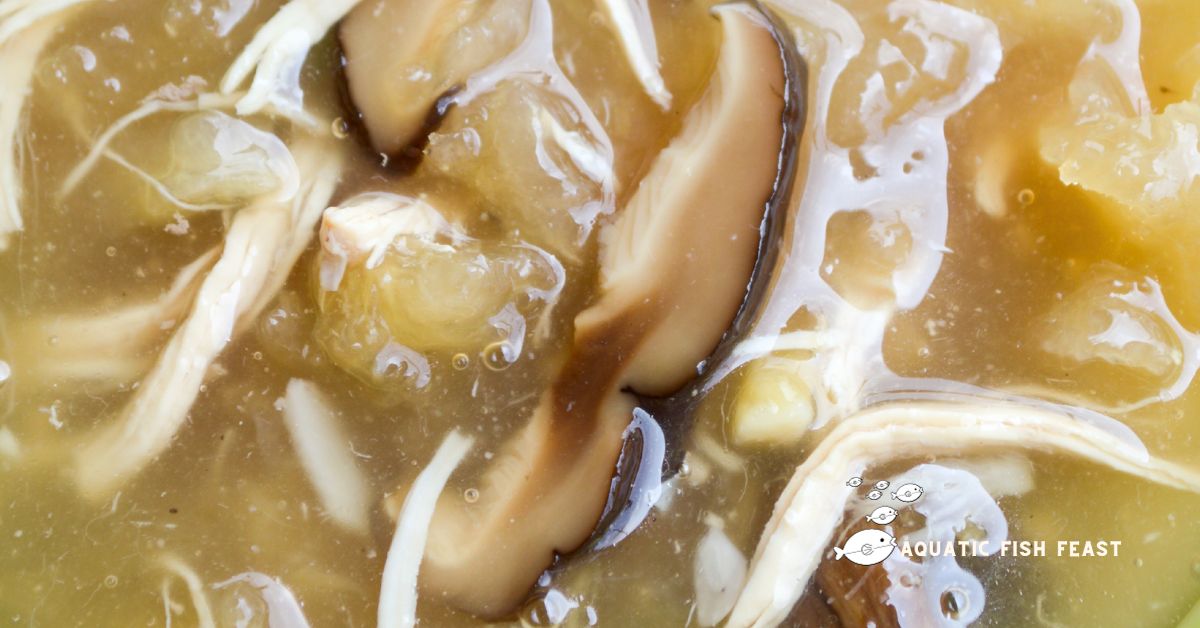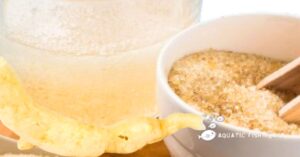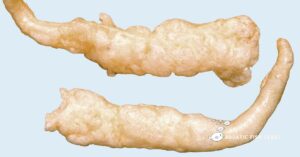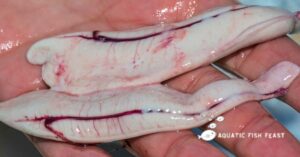When you have been diagnosed with cancer issues, It is natural for such persons to want to seek ways complementary approaches to their treatment.
One of what comes to mind is the dietary choices that may positively impact their health and well-being.
Among the best options is fish maw, a delicacy obtained from the swim bladders of some certain fish.
But the question you may be asking yourself now is that could be, what exactly does Fish Maw have to offer for cancer patients?
In this article, we shall explore the scientific evidence, nutritional composition, expert opinions, considerations, alternative options, and my experience with eating fish maw for people going through cancer treatment.
Now, let’s get started.
Table of Contents
Is Fish Maw Good For Cancer Patients
The scientific evidence is still limited, based on the research that focused on the effects of fish maw on cancer patients.
However, fish maw contains a lot of collagen, protein, and important minerals that improve health.
These nutrients can additionally boost immunity, restore tissue, and heal wounds. These qualities are crucial for cancer patients.
The nutritional composition of fish maw is a wonderful combination that can help build your body’s immune system, which is equal to speed recovery.
As you know. Fish maw has a high collagen concentration, making it useful for cancer patients’ skin health and wound healing.
It’s also high in protein, which is good for maintaining muscular build-up and strength during cancer treatment.
Fish maw is also low in fat and calories, making it a healthier complement to cancer patients’ diets.
Nutritionists and dietitians cannot stress enough the significance of a well-balanced diet directed to cancer patients’ specific needs and treatment plans.
While fish maw can provide essential nutrients, experts still recommend consulting healthcare professionals before making significant dietary changes, especially during cancer treatment, as your first choice.
Fish Maw Alternative For Cancer Patients?
Many fish maw benefits for cancer patients have been suggested. The drawback is that there are a few crucial factors to consider when considering including fish maw in cancer patients’ diets.
Some people may be allergic or sensitive to seafood in general. That is why it is essential to approach any bad responses cautiously and pay great attention.
Diverse dietary methods can help cancer patients who don’t like fish maw or are allergic—eating fruits, vegetables, lean meats, and healthy fats to achieve this.
Adding or blending one of these foods into your diet helps ensure you get the nutrients you need during cancer treatment.
Is Catfish Maw Good For Cancer Patients
In addition to being a rich source of potassium and selenium, Vitamins B6 and B12, catfish are also an excellent source of selenium.
All of these nutrients offer a variety of advantages to one’s health, including the promotion of lower cholesterol levels, the maintenance of a robust immune system, the control of elevated blood pressure, the prevention of particular forms of cancer, and a decreased risk of stroke.
There are several positive effects that catfish may have on one’s health. High in protein, low in cholesterol, and rich in omega-3 fatty acids, they lower inflammation and enhance heart health.
Consuming catfish is another fantastic approach to reducing the cost of your overall meal expenses.
Fillets of catfish are often available at a price point that is considerably more reasonable than that of other varieties of seafood, such as salmon or shrimp.
In addition, catfish may be prepared using many cooking methods, such as frying, grilling, or steaming.
Does Fish Cause Cancer
Recently, research conducted by Brown University revealed that fish consumption was “positively associated with risk of both malignant melanoma and melanoma in situ.” The findings of this study generated news all over the world.
However, the researchers stated that further research was required and refrained from proposing that individuals lessen their fish consumption or stop eating it altogether.
However, the researchers claimed that even if there is a link between eating seafood and developing melanoma, it is not the fish themselves that are to blame but rather the poisons in the fish.
“We speculate that our findings could be attributed to contaminants in fish, such as polychlorinated biphenyls (PCBs), dioxins, arsenic, and mercury,” stated the study’s author, Eunyoung Cho, ScD, an associate professor of dermatology and epidemiology at Brown University, in a press release. Cho is also the director of the Brown University Dermatology and Epidemiology Center.
Does Eating Fish Reduce The Risk Of Cancer
Food rich in fish and omega-3 fatty acids may reduce the risk of developing cancer. The idea that eating a lot of fish may lower your chance of getting liver and intestinal cancers is supported by some research.
Consuming fish can provide other health advantages, including a lower chance of acquiring dementia in older persons, a lower risk of cardiovascular disease, stroke, and age-related macular degeneration in the eyes, and a reduced risk of getting cardiovascular disease.
Does Eating Fish Can Support The Fight Against Breast Cancer
The short answer is “Yes.” People who have breast cancer and eat fish high in omega-3 fatty acids are thought to benefit from the fatty acids they get from the fish.
Fatty acids, such as omega-3, in particular, can be beneficial.
1. Take measures to prevent the growth of breast cancer cells
2. Slow down the growth of breast cancer.
To be more exact, those breast cancer patients who participated in this study and had a more significant food consumption of such nutrients had an approximate 25% lower risk of further health problems connected to breast cancer.
This was the finding among the 3,000+ participants who had breast cancer.
The following are some examples of fish that have significant quantities of specific fatty acids:
- The haddock
- Cod
- The halibut
- The Salmon
- The sardine.
Which Fish Fights Cancer
The omega-3 fatty acids, vitamin B, and potassium that may be found in fatty fish such as salmon, mackerel, and anchovies make this fish an excellent source of nutrition.
People whose diets didn’t include much freshwater fish were 53% less likely to get colon cancer than those who ate a lot of freshwater fish.
Consuming fish oil later in life may be associated with a substantially reduced chance of developing prostate cancer.
Last but not least, a study of 68,109 people found that those who took fish oil pills at least four times a week were 63% less likely to get colon cancer than those who didn’t.
What Fish To Avoid For Cancer Patients
During cancer treatment, eating raw fish is not recommended. However, some species of cooked fish should also be avoided owing to their high mercury levels.
These fish include King mackerel, marlin, orange rough, shark, swordfish, tilefish, ahi tuna, and bigeye tuna.
E. coli, salmonella, and listeria are just a few examples of the harmful bacteria that may be found in undercooked food.
You should avoid eating raw or undercooked meals as much as possible to avoid becoming sick. B boiling the meal thoroughly kills these germs and any other bacteria or viruses that may have been transferred to your food due to inappropriate or negligent handling.
Taking measures while handling and preparing food can be helpful, such as using additional care when washing fruits and vegetables, particularly leafy green vegetables, which may hold loose dirt or other toxins. Taking these steps can assist.
Final Thought
Based on the article’s findings, fish maw is a great, beneficial, nutritious choice for cancer patients due to its remarkable collagen and protein content.
However, additional research is needed to understand its specific effects on cancer treatment outcomes fully.
As with any dietary decision you may make, cancer patients need to consult their healthcare team before making significant modifications to their diet.
By considering the scientific evidence, taking to expert opinions, and appreciating personal experiences, you could serve you to make informed decisions that support your health and well-being throughout your cancer journey.
More Reference:
- Wang, L. P., Zhang, H. L., Fan, Z. L., & Liu, M. C.. Purification, structure, and activity of an extrapallial glucomannan from abalone (Haliotis discus hannai). Journal of Agricultural and the Food Chemistry, 61(1), 126-132. doi: 10.1021/jf303528a
- Zhu, Y., Xie, F., Huang, W., Zhou, P., Liu, G., Lin, R., & Huang, M. Characterization and immunostimulatory activity of a low-molecular-weight polysaccharide from fish maw. International Journal of Biological Macromolecules, 64, 309-314. doi: 10.1016/j.ijbiomac.2013.12.033
- Chung, K. W., Leung, H. N., Chau, S. M., Sze, S. C., Lee, C. K., Leung, P. L., & Lam, S. C.. Immunomodulatory activities of polysaccharide extract isolated from Curvularia lunata in macrophages and mice. International Immunopharmacology, 5(10), 1525-1533. doi: 10.1016/j.intimp.2005.05.015
- Wong, Y. M., Cheng, M. K., & Wu, R. S. Biochemical composition, antimicrobial, antioxidant, antidiabetic, anticancer, and antiinflammatory activities of fish maw hydrolysates prepared from two marine fish species. Journal of Food Biochemistry, 44(5), e13216. doi: 10.1111/jfbc.13216




